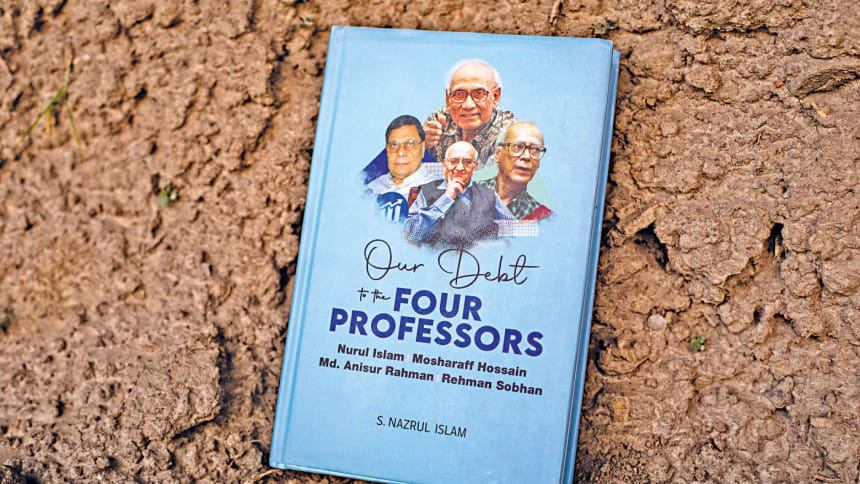An intellectual debt worth remembering

The history of Bangladesh's conception is incomplete without recognising the multitudes of sacrifices and labour that academics and intellectuals had poured into their aspirations for Bangladesh, often at the cost of their own safety and livelihood. In S. Nazrul Islam's Our Debt to the Four Professors, we find a primer that does some justice in acknowledging the determination and hard work of four professors who played pivotal roles in Bangladesh's making and subsequent development.
S. Nazrul Islam is a distinguished academic himself, who had taught at various universities and had been chief of research at the department of Economics of the UN. He makes good use of his expertise in constructing what he terms a "treatise on the socio-political history of early Bangladesh." Indeed, as one reads through the book, they get a unique sense of how the nation in its early stages grappled with the myriad of problems that it inherited, some due to its geography, and others due to international realpolitik, such as when the country had to take debt liability for some of Pakistan's international debt, regarding projects undertaken before independence.
The four professors here are the economists Nurul Islam, Mosharaff Hossain, Md. Anisur Rahman, and Rehman Sobhan. Interestingly, we get a glimpse of their ideological similarities and differences regarding each other quite pointedly through the author, who reflected in his preface that he had the "good fortune of knowing and interacting" with all of them. We are gifted an inside look of how these intellectuals grappled with the prevailing political sentiments of the time, such as the impetus for nationalisation and for socialist principles.
The earlier sections of the book recount how the professors had been instrumental in the makings of the idea of the two economies in erstwhile Pakistan. With Professor Nurul remarking: "The labor from East Pakistan could not thereby participate in and benefit from the expanding employment and income opportunities created in West Pakistan through higher rates of investment, financed, to a great extent, by savings siphoned off from East Pakistan."
The crucial roles they played in the movement for autonomy only gave way to their determination to fight for the liberation war, in any capacity possible. Mosharaff Hossain had been part of the planning cell in the provincial government in Calcutta. Rehman Sobhan had been instrumental in swaying the international community toward the idea of an independent Bangladesh. When he returned in the August of 1971 in India to present his reports, the cabinet had thanked him, designating him "Envoy Extraordinaire, in charge of Economic Affairs." The book is full of interesting information: Rehman Sobhan, during his return, realises that the Mujibnagar Government was headquartered in 12 Theater Road in the same house where his maternal grandfather, Khawaja Nazimuddin (who would later go on to become Prime Minister of Pakistan) had stayed during his stint as Chief Minister of Bengal.
The crucial roles they played in the movement for autonomy only gave way to their determination to fight for the liberation war, in any capacity possible. Mosharaff Hossain had been part of the planning cell in the provincial government in Calcutta.
Post-independence, all four of the professors had worked in the Bangladesh Planning Commission, where Nurul Islam held the chair of deputy chairman. The academics' resilience in working through the bureaucracy and navigating through the ministries and often challenging party-leaders is well-documented in this book. Nazrul Islam notes how they had to be given ranks (Professor Nurul was given the rank of a minister, while the other three were provided the rank of state-minister) because the bureaucrats at the time were not willing to accept the authority of outside experts.
The book also chronicles the ideological wrangling that the young nation was embroiled in. The different factions of politics such as those espoused by some in the then ruling party as "Mujibbad" and the "Scientific Socialism" of Sirajul Alam Khan clashed with each other and the professors often had to traverse through these ideas while making policy.
Nazrul Islam's book ends around the time of the 1975 assassination of Sheikh Mujibur Rahman, which had a profound effect on all four personalities, as they had often worked closely with the leader. The author makes a fascinating observation about how Nurul Islam and Rehman Sobhan's relationship with Bangabandhu had opposite dimensions. The former was "ideologically somewhat distant but personally closer", while the latter had close ideological ties but was personally distant from the leader.
Our Debt to the Four Professors is remarkably important at a time like this, when the country is reevaluating and revamping many of its historicity. The achievements and sacrifices of all who had made the country a better place to live in surely should be documented and this book does a splendid job at celebrating the extraordinary individuals who had left an inevitable mark on Bangladesh for the better.
Jahangir Islam is an occasional contributor at Star Books.

 For all latest news, follow The Daily Star's Google News channel.
For all latest news, follow The Daily Star's Google News channel. 



Comments